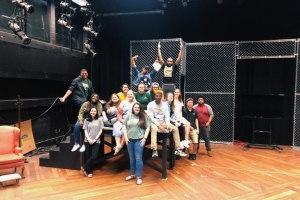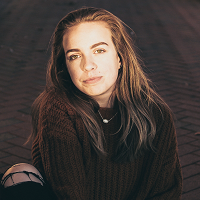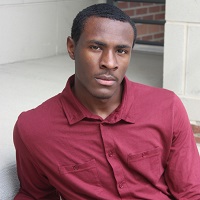
Last spring's applied theatre course, The Questioning Justice Project, took on even greater urgency when COVID interrupted the semester (and life), and the murder of George Floyd activated national protests. The course, taught by professors Beth Murray and David Fillmore, challenged the 17 students to ask: What is justice? What are the many forms of justice? How does justice work, and not work? And who decides what is just, anyway?
Research, interviews, deep thought, and lots of artistic creativity went into The Questioning Justice Project. Quarantine forced the class to shift from a live devised theatre performance for young audiences to online products - among them poetry, videos, and "justice anthems."
Theatre students Xavier Stinson and Kyra Hubert were in the class. Here they discuss why they chose the class and what they learned.
Why did you decide to take this class?
KYRA: I felt like it was a very important topic to dive into, especially in a class with different viewpoints.
XAVIER: As a senior, I felt it was only right for my acting skills to provide insights to many cold truths.
What are the most important or impactful things you discovered?
XAVIER: I think the most impactful thing I learned from this class is the number of different justices that are not discussed on the regular. When it comes to justice, we think of crime/judicial before food, climate, and health.
KYRA: One of the most impactful things I noticed was the fact that not everyone looked at justice the same way. Some saw it as a bigger idea, and some saw it smaller.
What activity did you find most meaningful?
KYRA: The most meaningful activity was when my partner (Christina Smith) and I came up with a performance about Women in Media. We became super emotionally connected to the piece and couldn't wait to make it a bigger concept and performance idea.
 What was the most fun?
What was the most fun?
XAVIER: The most fun activity would have to be blindfolded activity. We were partnered up… one would be blindfolded, while the other steered them by their shoulders. The objective was to not get into a collision with another group, so the ones steering had to scream, “turn left, turn right, stop, go.” At first, I didn't quite get why we were doing this type of activity. I realized that not only did we define justice, but gained an idea of how it might feel.
Has this project changed the way you think about theatre and the role of theatre in the world?
KYRA: I think I've always thought that theatre has the power to make people feel and learn something in every performance. Theatre is meant to trigger you and to make you think. It's not meant to just be something entertaining. There's so much more that goes into it.
Has this project changed the way you think about the world in general?
XAVIER: I try to pay attention to the details of whatever mainstream media and wonder why they are pushing a certain side of a story more than another. Or why certain powerful judicial figures cannot give justice to families that have lost a loved one due to police brutality.
KYRA: The world is complicated. This project has really opened my eyes to notice that justice is not the easiest concept to understand. So many people have different viewpoints, and it's really important for people to not be super close-minded.
Do you have any further plans or hopes that are a result of this project?
XAVIER: Some hopes I have gained since this project is that colleagues and I should probably get together to curate a show based around things happening around us.
KYRA: Christina and I really want to go further with the concept we created in the Women in Media video. We've thrown a lot of ideas at each other. We are super passionate about lifting one another up, especially when we are in a world like this where we are torn down a lot for just our gender.
Pictured above, The Questioning Justice Project students on March 13, their final day of in-person class.